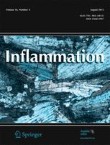
Medicine by Alexandros G. Sfakianakis,Anapafseos 5 Agios Nikolaos 72100 Crete Greece,00302841026182,00306932607174,alsfakia@gmail.com,
Ετικέτες
Πέμπτη 2 Απριλίου 2020
Anti-Ulcerative Effect of Curcumin-Galactomannoside Complex on Acetic Acid-Induced Experimental Model by Inhibiting Inflammation and Oxidative Stress
Anti-Ulcerative Effect of Curcumin-Galactomannoside Complex on Acetic Acid-Induced Experimental Model by Inhibiting Inflammation and Oxidative Stress:


Ulcerative colitis (UC) is a chronic inflammatory bowel disease that affects the mucosa and submucosa of colon. The pathogenesis of ulcerative colitis (UC) is related to reduced antioxidant capacity and increased inflammatory processes. Reactive oxygen metabolites are the potent inflammatory mediators that may be involved in tissue injury in inflammatory bowel disease. Conventional drug therapies for UC come with a myriad of side effects which further raise the need for natural bioactive agents. Curcumin has proven to be beneficial in the prevention and treatment of a number of inflammatory diseases, but due its poor bioavailability, the therapeutic applications are limited. Thus, to enhance its bioavailability, a new formulation - curcumin-galactomannoside (CGM)- was made by complexing curcumin with galactomannans derived from fenugreek. The present study aims to evaluate the effects of CGM on experimental UC model. Adult male Wistar rats were divided into 5 groups: normal control rats (NC); ulcerative colitis control rats (UC); UC + sulfasalazine (SS) treated; UC + curcumin (CM) treated; and UC + CGM supplemented for 21 days. The colonic mucosal injury was assessed by macroscopic and histological examination, along with evaluation of antioxidant status, inflammatory mediators, and gene expressions. Administration of CGM significantly enhanced antioxidant activities and decreased the level of inflammatory mediators and also suppressed the expression of inflammatory markers as compared with other groups. In conclusion, findings from these results reveal that CGM exerts marked curative effects on acute experimental colitis, possibly by regulating the antioxidant status and modulating inflammatory cascade.
Αναρτήθηκε από
Medicine by Alexandros G. Sfakianakis,Anapafseos 5 Agios Nikolaos 72100 Crete Greece,00302841026182,00306932607174,alsfakia@gmail.com,
στις
11:31 μ.μ.

Ετικέτες
00302841026182,
00306932607174,
alsfakia@gmail.com,
Anapafseos 5 Agios Nikolaos 72100 Crete Greece,
Medicine by Alexandros G. Sfakianakis,
Telephone consultation 11855 int 1193
Εγγραφή σε:
Σχόλια ανάρτησης (Atom)

Δεν υπάρχουν σχόλια:
Δημοσίευση σχολίου